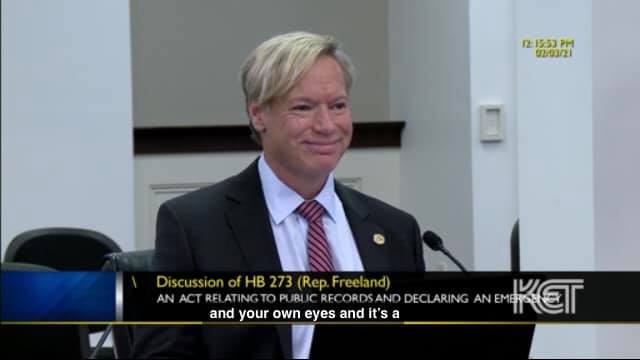
Following up on our February 4 post about HB 273, sponsored by Rep. Chris Freeland, which will create a new exception to the open records law for "photographs or videos that depict a person's death, killing, rape, or sexual assault or abuse."
https://apps.legislature.ky.gov/record/21RS/hb273.html
https://www.facebook.com/419650175248377/posts/857468471466543/?d=n
The bill was proposed in response to release of video taken at the scene of the Marshall County High School shootings in 2018 and honors the students who were killed, Bailey Nicole Holt and Preston Ryan Cope.
A review of the February 3 House Judiciary Committee meeting video indicates that the bill was "added [to the agenda] yesterday [the day on which Sen. Danny Carroll's companion bill—SB 130âwas introduced] at the request of some membership."
https://ket.org/share/legislature/archives/?nola=WGAOS+022049&stream=aH…
Discussion of Freeland's bill begins at the 9:00 minute mark. The chairman introduces Freeland who then describes the bills. At 9:43 in the video—and barely into the description—an unidentified committee member moves for passage and is immediately seconded.
Noting "a trend," the chairman asks if there is any discussion. Rep. Mackenzie Cantrell comments on the power of images in news stories—such as the Kentucky Center for Investigative Reporting story on workplace violations resulting in deaths—asking about the impact of the bill when there is a "public interest."
Freeland responds that the bill "addresses any evidence used in trial" and that he does not know how the bill "would impact this."
(This seems like something he should know.)
He notes that a victim or family member may request release of the otherwise exempt photo or video.
Rep. Jason Nemes then comments that discovery in legal actions is unaffected by the bill and that "we are only talking about open records act disclosure."
(Correct. This bill creates an exception to the *open records law.*")
The bill was then reported favorably out of committee with no dissenting votes.
These comments suggest a level of confusion that would warrant further discussion. The open records act does not apply to the courts. Access to evidence in the hands of the court is not governed by the act.
https://law.justia.com/cases/kentucky/supreme-court/1978/570-s-w-2d-617…
Rep. Cantrell broached the question of situations in which the "public's interest" might need to be considered. Rep. Freeland stated that he did not know how his bill would "impact this." Rep. Nemes offered reassurance that the bill "only talk[s] about the open records act" and that court rules governing discovery would not be affected.
Given the last minute addition of Rep. Freeland's bill "at the request of some membership," the bill was advanced without any opposing testimony. Stated politely, the public interest in free and open examination of public records was under-represented.
The "public interest" in bystander and surveillance photos and videos—demonstrated again and again in the last few years—was, in fact, summarily dismissed.
If Rep. Freeland's goal is to create an exception for photographs and video used as evidence in a trial, this bill is a waste of time. An open records request to the court for photos or videos used as evidence triggers no duty under the open records law. Many requests to the courts are ignored or dispensed with by boilerplate letters stating that the courts are not subject to the law.
He may not know how his new exception will impact open records access, but we are, in fact, "only talking" about open records since the act does not apply to records of the courts.
And whatever Freeland's intent, it is likely that law enforcement agencies into whose hands such bystander and surveillance photos and videos fall will flatly deny access on the basis of the new exception, both during an investigation and enforcement action and after it is concluded, without regard to any competing public interest in disclosure.
There is a compelling argument that in many cases the public interest must yield to privacy interests of surviving victims and family members of victims who died.
But not in *all* cases. It is simply not sufficient that family members may request release of the photos and/or videos.
The 45 year old privacy exception to the open records law strikes the appropriate balance between the public and private interests in such photos and videos on a case by case basis, recognizing that "the policy of disclosure is purposed to subserve the public interest, not to satisfy the public's curiosity."
https://www.casemine.com/judgement/us/591487c7add7b049344e99a0/amp
"The only relevant public interest in disclosure to be considered is the extent to which disclosure would serve the principle purpose of the Open Records Act. At its most basic level, the purpose of disclosure focuses on the citizens' right to be informed as to what their government is doing."
https://law.justia.com/cases/kentucky/court-of-appeals/1994/93-ca-00185…
Disclosure of photos and videos "that depict a person's death, killing, rape, or sexual assault or abuse" should be permitted if it serves the principle purpose of the open records law by enabling us to be informed about public agencies', officials', and employees' conduct.
This is where bystander and surveillance video, such as the videos in the George Floyd or Rayshard Brooks cases, comes into play. Clearly, disclosure of those videos enabled the public to "be informed" about police officer conduct.
Where disclosure merely satisfies the public's curiosity, and will traumatize victims and surviving family members, it should not be permitted.
That is the current state of the open records law under the existing privacy exception.
The tragic circumstances that gave rise to HB 273 should not result in enactment of bad and unneeded law.
But the bill—which received its second reading on February 4 and was posted for passage in the Regular Orders of the Day for February 9—is on a clear and unimpeded path to enactment.


